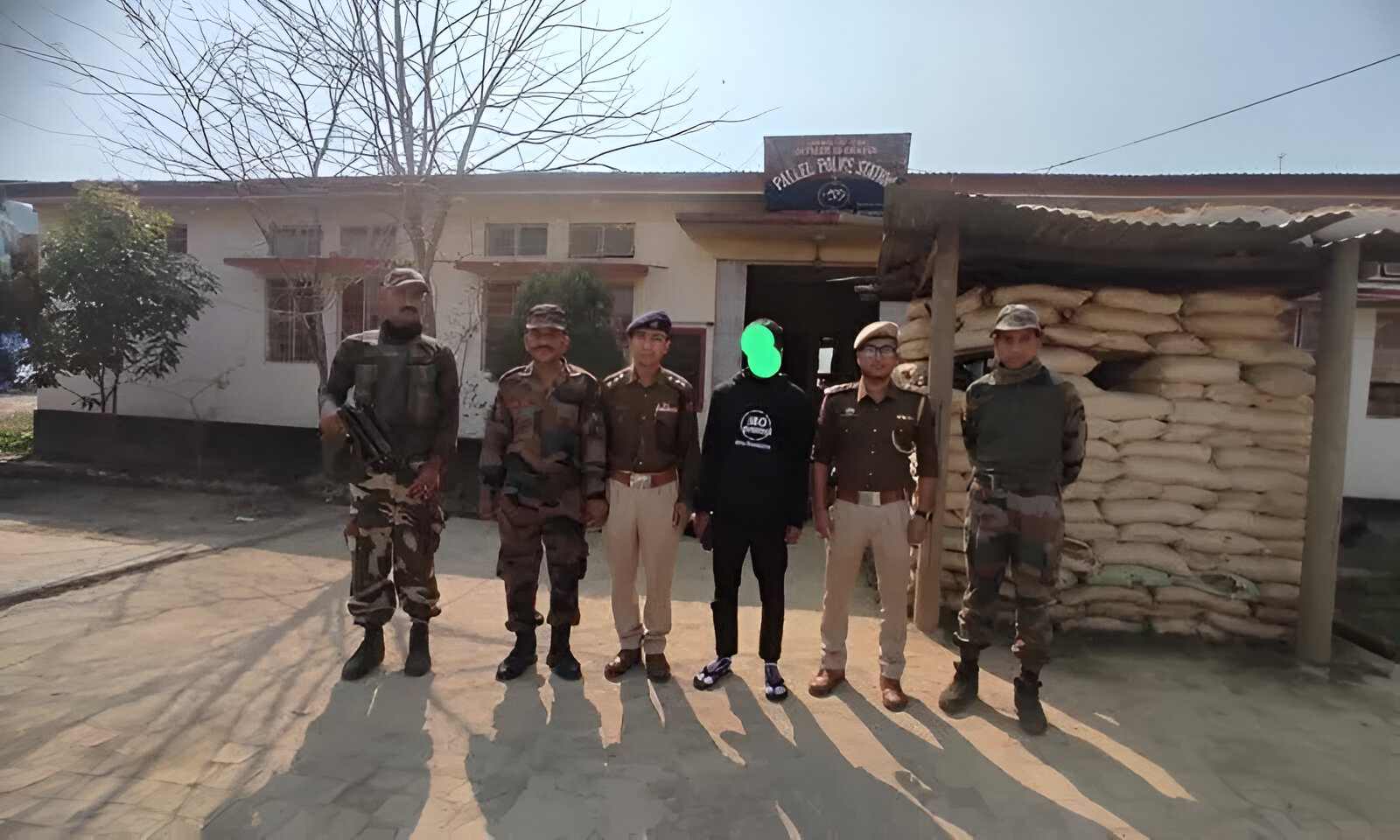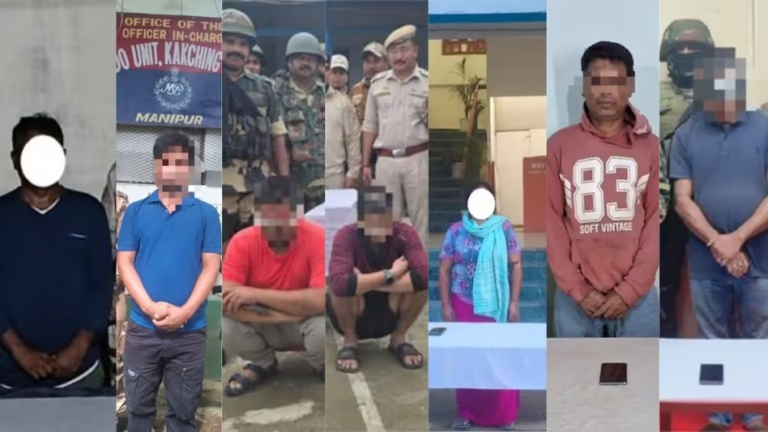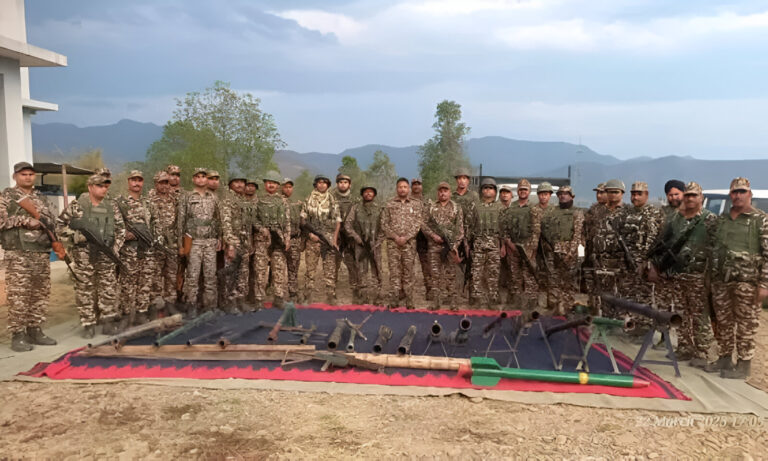Manipur: 3 Cadres of KYKL Arrested in Separate Operations
Summary
In a series of focused operations in Manipur, law enforcement agencies successfully apprehended three cadres linked to the KYKL group. These separate operations underscore the state’s relentless efforts to crack down on militant activities and safeguard regional security. Authorities are intensifying their investigations to dismantle the network and restore peace, ensuring that communities remain protected from any disruptive influences.
Long Article
Introduction: Unraveling the Story Behind the Arrests
Imagine living in a region where every day brings news of decisive actions by local law enforcement—actions that ensure your community remains safe and your rights are protected. Recently, Manipur witnessed such a pivotal moment when authorities arrested three cadres of the KYKL group in separate operations. This bold crackdown highlights not only the growing determination of the police but also the ongoing challenges they face in curbing extremist activities in the region.
If you’re curious about what these arrests mean, how they came about, and the potential implications for Manipur’s security landscape, then you’re in the right place. In this article, we’ll delve deep into the details of these operations, examine the background of the KYKL group, and discuss the broader impact of these actions on local communities and the region as a whole.
Understanding the KYKL Group: Who Are They?
Before we unpack the specifics of the recent arrests, let’s take a moment to understand the group at the heart of this story—the KYKL. Although acronyms like KYKL might sound enigmatic, they represent a segment of organizations involved in activities that challenge law and order. Much like an intricate puzzle, understanding such groups requires piecing together bits of history, regional influences, and modern-day socio-political dynamics.
KYKL is perceived to be involved in activities that undermine peace and stability. Their methods, often shrouded in secrecy, include recruitment tactics and operations that span across multiple regions. For locals, the mere mention of such groups stirs up a mix of concern and determination. It’s akin to the warning signs on a stormy day; you know something is amiss, and everyone braces for the impact.
Details of the Separate Operations: A Coordinated Effort
Now, let’s get into the meat of the matter—the separate operations that led to the arrests. These operations, carried out independently yet with a shared goal, reflect the strategic acumen of Manipur’s law enforcement agencies. Each operation was meticulously planned, with intelligence gathering playing a crucial role.
Picture this: intelligence units tracking suspicious activities over weeks, gathering evidence, and then coordinating a timely response. That’s exactly what unfolded in Manipur. In one operation, officers moved swiftly on a tip-off, raiding a suspected hideout and securing evidence that pointed to illicit activities. In another, a separate team intercepted communications that led them straight to the individuals involved.
This multi-pronged approach is what makes these operations stand out. It’s not just about making arrests—it’s about sending a clear message to any group attempting to destabilize the region. The arrests of the three cadres, executed in separate operations, symbolize a robust network of surveillance and rapid response, designed to disrupt potential threats before they can escalate.
The Role of Law Enforcement: Guardians of Peace
Law enforcement in Manipur has always operated under challenging conditions, navigating complex terrains and dealing with multifaceted threats. The recent arrests are a testament to the dedication and resilience of these officers. Their relentless pursuit of justice, often in the face of significant risks, is what keeps communities safe and nurtures the hope of a peaceful future.
Have you ever wondered how law enforcement manages to stay one step ahead of groups like KYKL? It’s a blend of modern technology, community intelligence, and traditional policing methods. Officers not only rely on surveillance equipment and digital monitoring but also on the valuable insights provided by local residents. This symbiotic relationship between the police and the community creates a safety net that is both robust and responsive.
The operations in question were no different. Officers had to carefully plan each move, ensuring minimal collateral damage while maximizing the impact on the organization’s structure. Their success is a reminder that even in an era marked by sophisticated technology and cyber threats, the human element in law enforcement remains indispensable.
Why These Arrests Matter: Implications for Regional Security
The arrest of these three cadres goes beyond the immediate apprehension of individuals. It signifies a broader strategic victory for Manipur’s security forces. By disrupting the activities of the KYKL group, the state is sending a powerful message that unlawful activities and militant operations will not be tolerated.
Think of it as removing a weed from a garden—the sooner you address it, the less chance it has to spread and damage the entire ecosystem. In this context, the KYKL group represents that invasive weed, and the arrests are a decisive step towards reclaiming the security and stability of the region.
These actions also serve as a deterrent. When potential wrongdoers see that law enforcement is equipped, prepared, and willing to act decisively, the likelihood of future attempts to destabilize the region diminishes significantly. Moreover, the operations help restore public confidence. In times when the security environment feels unpredictable, knowing that dedicated professionals are actively working to maintain order can be incredibly reassuring.
The Broader Context: Security Challenges in Manipur
Manipur, like many regions, faces a unique set of challenges when it comes to security. Its strategic location, diverse population, and complex history create an environment where both external and internal threats can converge. The recent arrests are part of a larger narrative of ongoing efforts to maintain peace in a region that has seen its share of turbulence.
Security challenges in Manipur are often compared to navigating a maze—complex, unpredictable, and requiring both skill and perseverance. Law enforcement agencies must continuously adapt to evolving tactics used by various groups. This adaptability is key to their success and is reflected in the recent operations against the KYKL cadres.
In addition to the immediate threat of militant groups, there are also socio-economic factors that can contribute to unrest. High unemployment, limited infrastructure, and political disputes can sometimes create fertile ground for extremist ideologies. Recognizing these challenges, the state has been investing in both security measures and community development programs to address the root causes of instability.
Political and Diplomatic Repercussions: Navigating Sensitive Terrain
Any significant law enforcement action in regions like Manipur inevitably has political and diplomatic ramifications. The arrests of the KYKL cadres are likely to be scrutinized by various stakeholders—local political leaders, national policymakers, and even international observers.
Why does this matter? Because actions taken on the ground not only affect local communities but also shape the broader narrative of governance and state authority. Politicians may use such operations to highlight their commitment to law and order, while opponents might question the broader strategy or raise concerns about human rights and due process.
Furthermore, the diplomatic landscape in regions bordering volatile areas is delicate. Any aggressive move, even if well-intentioned, must be balanced with considerations of regional stability and international perceptions. Manipur’s law enforcement agencies, therefore, operate not just as enforcers of the law but also as ambassadors of peace, ensuring that their actions contribute to long-term stability rather than short-term gains.
Community Reactions: The Pulse of the People
No news about law enforcement is complete without understanding the reactions of the people on the ground. In Manipur, the community has long been wary of extremist elements and is often quick to welcome decisive action that promises to restore peace.
Local residents have expressed relief and optimism following the arrests. For many, these operations are a sign that the government is serious about protecting its citizens and reclaiming control over areas that might have been compromised by militant influences. Think of it as a breath of fresh air in an environment where the shadows of unrest can sometimes loom large.
Community leaders have also played an essential role in these operations. They act as bridges between the police and the public, ensuring that accurate information is shared and that the community remains vigilant. Their active involvement not only enhances the effectiveness of law enforcement efforts but also fosters a sense of collective responsibility. When communities come together to support such initiatives, it creates a powerful force that can drive lasting change.
Challenges Faced During the Operations
Despite the success of these operations, the road to achieving such results is rarely smooth. Law enforcement agencies often face numerous obstacles—ranging from limited resources and manpower to the need for precise intelligence and coordination among different units.
One of the biggest challenges is the ever-present risk of retaliation. Groups like KYKL, known for their clandestine operations, may resort to countermeasures aimed at disrupting police activities. This constant threat requires a level of preparedness and adaptability that is both challenging and exhausting. It’s like playing a high-stakes game of chess, where every move must be calculated and every counter-move anticipated.
Furthermore, operating in rugged terrains and urban settings alike requires different strategies and tools. The officers must be adept at switching between high-tech surveillance methods and traditional ground-level intelligence gathering. Each operation is a learning experience, and every success or setback contributes to the evolution of the strategies used by law enforcement.
Legal Implications and the Justice Process
Once the cadres are arrested, the next step is navigating the legal process—a journey that is as crucial as the operation itself. The justice system must ensure that the individuals apprehended are given a fair trial, and that their involvement in unlawful activities is thoroughly investigated and proven beyond doubt.
The legal implications of such arrests are significant. They not only involve the direct prosecution of those implicated in criminal activities but also set precedents for how similar cases might be handled in the future. Transparent legal proceedings can help build public trust, while any perceived lapses may lead to further unrest and skepticism among the people.
Moreover, the legal process often involves a detailed examination of the evidence gathered during the operations. This evidence, ranging from digital communications to physical materials, must be meticulously analyzed to build a solid case. In many ways, the judicial process acts as the final safeguard, ensuring that justice is not only done but is seen to be done.
Expert Opinions: What Analysts Are Saying
Experts in security and political science have weighed in on the recent developments with a mix of optimism and caution. Many believe that the successful arrests are a positive indicator of the state’s commitment to maintaining law and order. They point out that such operations are essential to dismantle the networks that can otherwise grow unchecked and pose a serious threat to regional stability.
At the same time, analysts stress the need for a balanced approach. While aggressive action against extremist elements is necessary, it should not come at the cost of alienating local communities or exacerbating underlying socio-economic issues. In their view, the long-term success of such initiatives depends on the simultaneous implementation of community development programs, robust legal frameworks, and ongoing dialogue between the police and the public.
Comparative Analysis: Lessons from Similar Operations
When we look at other regions facing similar challenges, the story of the KYKL arrests in Manipur stands out as both inspiring and instructive. Similar operations in different parts of the country and even internationally have taught law enforcement agencies valuable lessons. For instance, coordinated raids and targeted operations have often been more effective than broad, sweeping measures that risk collateral damage.
Comparisons can be drawn to operations in areas with comparable security challenges, where focused intelligence-led policing has yielded significant results. These comparisons remind us that while each region has its unique context, the underlying principles of effective law enforcement remain universal: intelligence, precision, and community involvement.
The Road Ahead: Strengthening Security and Building Trust
So, what does the future hold after such a landmark operation? The arrest of the KYKL cadres is not an end but a significant milestone in the ongoing effort to secure Manipur. Moving forward, law enforcement agencies must build on this momentum by enhancing intelligence capabilities, improving inter-agency coordination, and ensuring that justice is served swiftly and transparently.
In practical terms, this means investing in technology, training officers to handle complex operations, and fostering stronger community relationships. When residents see that their concerns are being addressed and that the government is proactive in protecting their rights, trust in the system is naturally strengthened. This trust, in turn, creates a virtuous cycle—where increased cooperation between the public and the police leads to more effective security measures and, ultimately, a safer environment for everyone.
Embracing Change: Socio-Economic Initiatives as a Complement
Security isn’t built by police work alone. For lasting peace and stability, it’s essential to address the socio-economic factors that can drive unrest. In Manipur, initiatives aimed at boosting local employment, improving infrastructure, and enhancing education are just as important as any operation against militant groups.
Imagine a community where, alongside strong security measures, there are ample opportunities for young people to engage in productive activities—be it through skill development, entrepreneurship, or community projects. Such initiatives not only reduce the allure of extremist activities but also empower residents to take charge of their own futures. In this way, socio-economic development becomes a powerful ally in the broader fight for peace and stability.
Bridging the Gap: Communication and Transparency
One of the recurring themes in successful law enforcement operations is transparency. When the authorities communicate clearly and regularly with the public, it helps bridge the gap between policy and practice. Manipur’s police have been working on improving their communication strategies, using both traditional media and digital platforms to keep the community informed about ongoing operations and developments.
This open communication fosters a sense of shared responsibility. It’s like having a town hall meeting where everyone gets to voice their concerns and contribute ideas. When people feel heard and informed, they’re more likely to support initiatives that aim to protect and improve their community. In turn, this strengthens the overall resilience of the region against external threats.
Conclusion: A Step Toward a Safer Manipur
As we wrap up our exploration of the recent arrests of the KYKL cadres in Manipur, one thing is abundantly clear: the efforts of the law enforcement agencies have struck a significant blow against extremist activities in the region. The meticulous planning, community cooperation, and relentless pursuit of justice exemplify what it means to work for the greater good.
These operations remind us that the quest for security is an ongoing journey—one that requires vigilance, adaptation, and a commitment to safeguarding the rights of every citizen. The arrests of the three cadres not only disrupt the current operations of a group like KYKL but also serve as a potent reminder that every effort counts when it comes to protecting our communities.
In a region as dynamic and complex as Manipur, every action on the ground contributes to a larger narrative of resilience and progress. The path ahead may be fraught with challenges, but with continued cooperation between law enforcement, community leaders, and the public, the future looks promising. It is our collective responsibility to build on these successes and work toward a safer, more prosperous tomorrow.
FAQs
- What prompted the arrest of the three KYKL cadres in Manipur?
The arrests were the result of targeted operations by law enforcement agencies based on reliable intelligence that indicated the involvement of these individuals in activities that threatened regional security. - How were the separate operations conducted?
Each operation was planned independently, relying on a combination of advanced surveillance, local intelligence, and coordinated efforts by specialized police units to swiftly neutralize potential threats. - What impact do these arrests have on the security landscape in Manipur?
The arrests serve as a strong deterrent against extremist activities and help restore public confidence in the state’s ability to maintain law and order, paving the way for long-term stability and safety. - How are local communities reacting to these developments?
Many residents have expressed relief and optimism, viewing the operations as a decisive step towards a safer environment. Community involvement and transparency have further bolstered public trust in the authorities. - What measures are being taken to prevent similar incidents in the future?
In addition to ongoing operations, law enforcement agencies are investing in better technology, intelligence gathering, and community outreach programs to proactively address and prevent potential threats.




